PRESTO PLANS
Sent straight to your inbox
CLICK HERE TO ACCESS
Sign up to receive 10 ready-to-use ELA resources your students will love!
10 FREE ELA RESOURCES
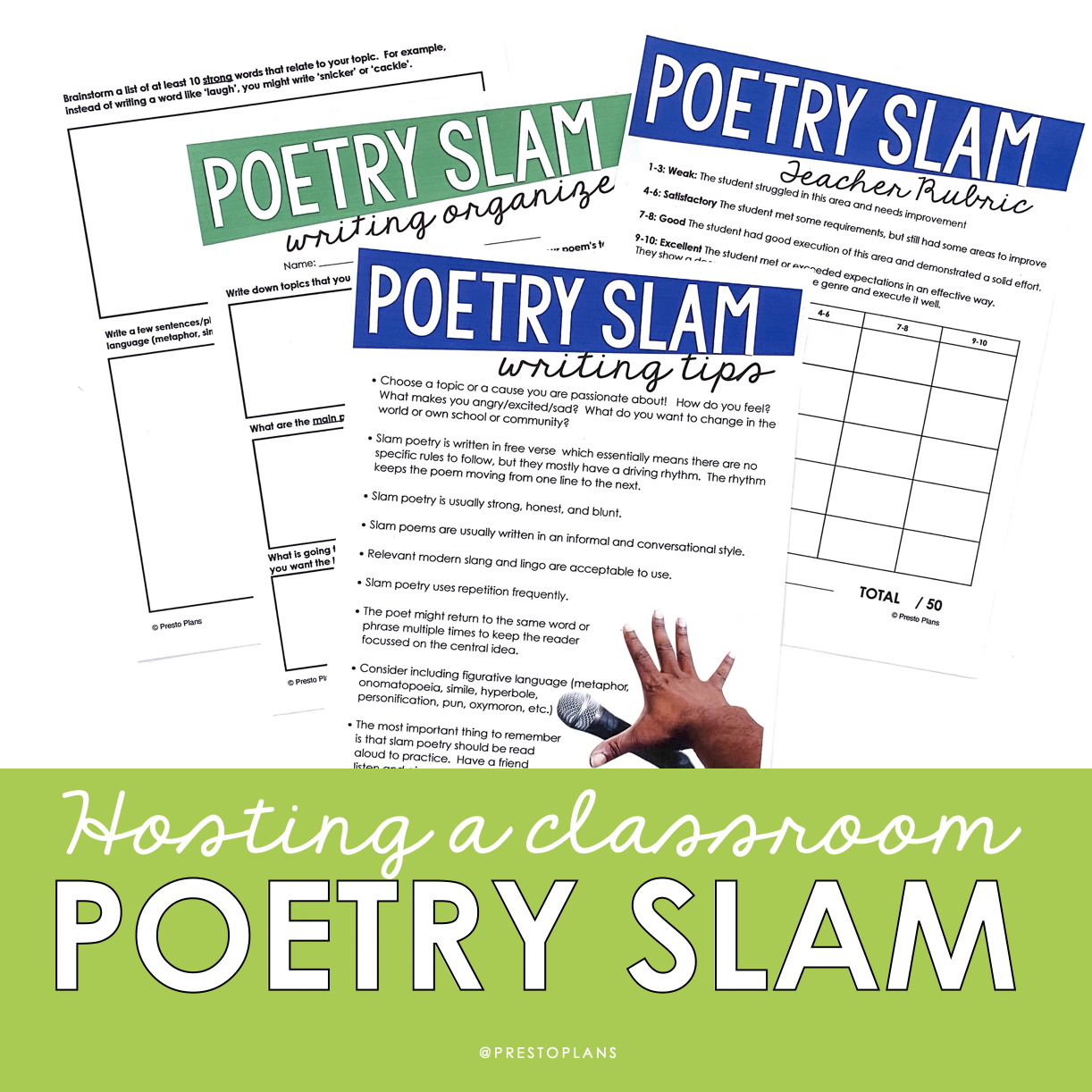
Host a Poetry Slam in Your Classroom
Have you ever found it difficult to get all of your students to buy into your poetry unit? I know I’ve felt that way before. I think some of this reluctance comes from the perception of poetry being an outdated form of creative expression. This is not true, of course. Poetry is written, read, and enjoyed by people all over the world every day. Still, it can nonetheless feel like there is a barrier to entry with poetry that is not necessarily there with novels or other forms of writing. Hosting a poetry slam is a great way to break down this barrier in your classroom. Here’s how you can easily host a poetry slam in the ELA classroom.
What is a Poetry Slam
Start by explaining to your students what exactly a poetry slam is. A poetry slam is a competitive event in which poets perform their work and are judged by members of the audience. At a poetry slam, you will hear spoken word poetry (also known as slam poetry). This type of poetry is meant to be presented on stage. Although some spoken word poetry can be found in writing, it is meant to be performed rather than exist in print. Some of your students are likely already familiar with slam poetry. This form of creative expression has become extremely popular in recent years, and many slam poetry videos have gone viral online.
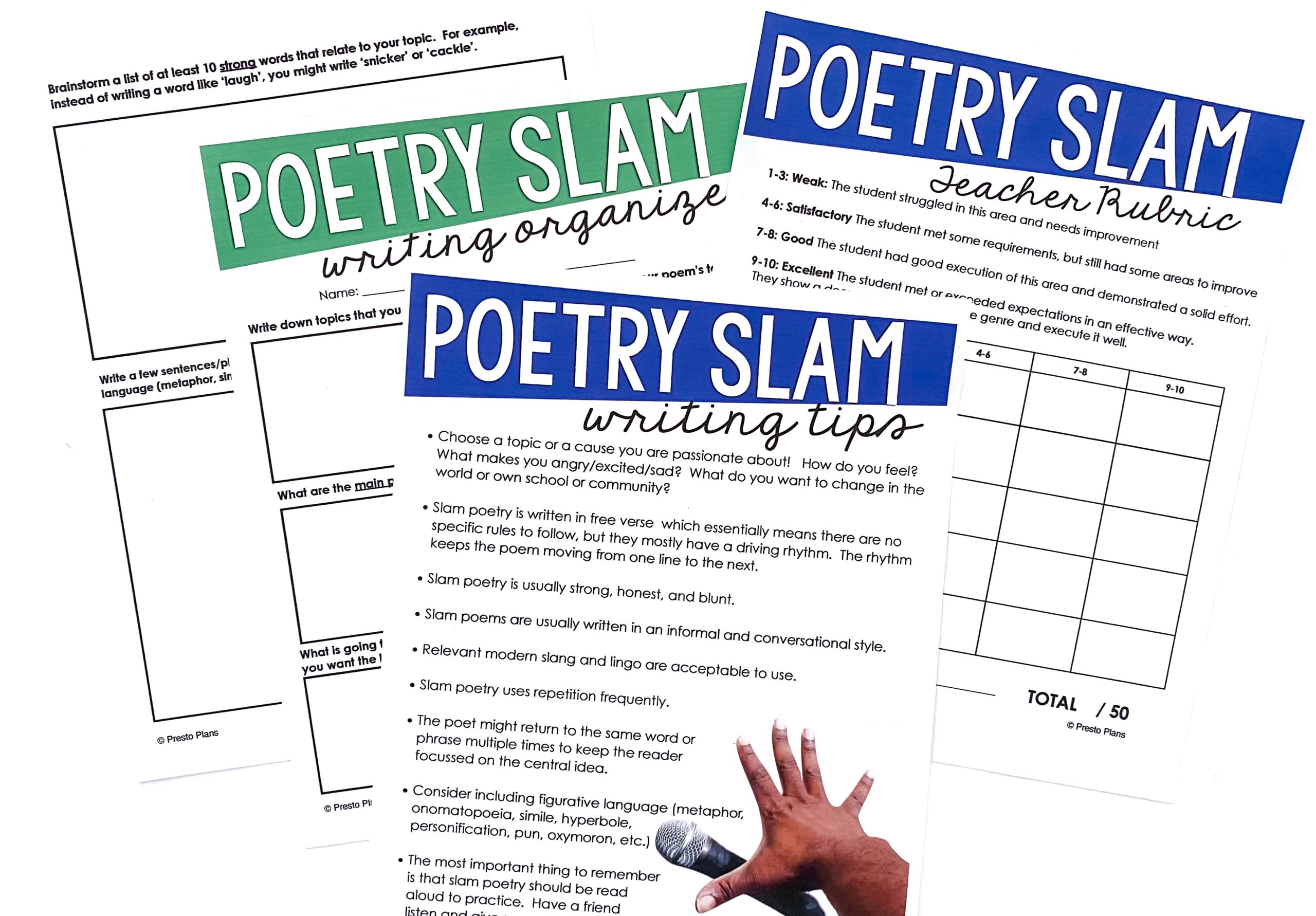 History and Background
History and Background
Slam poetry, just like all other types of poetry, has its own interesting history. Once your students have a strong understanding of what a poetry slam is, I suggest teaching them about how it got started.
In 1986, a construction worker and poet, Mark Smith, approached Dave Jemilo, the owner of the Green Mill (a Chicago jazz club), with a plan to host a weekly poetry competition on Sunday nights. Jemilo welcomed him, and the Uptown Poetry Slam was born on July 25 of that year.
Mark Smith instituted the basic features of the competition, including judges chosen from the audience and cash prizes for the winner. The Green Mill evolved to draw in performances from poets all around the world. Amazingly, the Uptown Poetry Slam continues to run every Sunday night!
Judging Slams
The next thing I like to do with students when hosting a classroom poetry slam is to get them to actually judge slam poetry. For this, I show students videos of different popular slam poetry performances on YouTube. I then get them to give a score for each one. You can have some fun with this by getting students to hold up a piece of paper with a score between one and ten!
Instead of giving students rubrics that guide how they judge the performances, I encourage them to score each one based on their gut reaction—how it made them feel, how much they connected with it, and how skilled they thought the performer was. I typically spend a whole class just watching and judging videos. Here are a few examples of videos that you can use with your class:
- Solli Raphael, 12, becomes the youngest winner of Australian Poetry Slam
- Marshall Davis Jones | Touchscreen
- MSA 2009 Slam Poetry
Outline the Rules
At this point, students should have a pretty strong understanding of what slam poetry is all about. Now is the time to outline the rules of poetry slams. They will want to keep these in mind when they start writing and practicing their slam poems. Although they may vary from slam to slam, I’ve listed four basic rules that you can follow below:
- Each poem must be of the poet’s own construction.
-
Each poet gets three minutes to read one poem (deduction for going over time).
-
The poet may not use props, costumes, or instruments.
-
Of the five scores, the highest and lowest are dropped and the middle three are added together (score between 0-30).
Topic Free Writing
Next, put a list of topics on the board that might elicit an emotional response from your students. One-word topics like music, friendship, environment, beauty, happiness, and fear tend to work well for this. Students can choose from one of these topics, or they can think of a topic on their own. In either case, encourage them to choose something that interests them, something from which they can offer their unique perspective.
Then, get your students to do some timed, 5-minute free write where they get all of their thoughts out on their chosen topic onto paper. Tell them to write whatever comes to mind and that they are not allowed to stop writing until the timer stops no matter what! The point here is to try and some strike inspiration while gathering what their thoughts are on their chosen topic.
Writing The Slam
Now it’s time for your students to write the slam poem itself, which can be informed by a powerful idea, word, or line they came up with during their free-writing exercise. First, however, I get them to fill out a poetry slam writing organizer that includes questions to help them organize their thoughts. Here are a couple of questions you might include in yours:
- What are the main points that you want your listener to consider about your chosen topic?
- What is going to be the tone of your poem?
Then, once they have mapped out the direction of their slam poem, I get students to write it out in its entirety, get peer feedback on it, edit the poem, and then perfect it!
Practice, Practice Practice!
Once students are happy with their slam poem, it is time for them to practice performing it. It is important to note that slam poems do not need to be memorized; they can simply be read. In either case, the more a student practices it, the more natural it will feel, and the higher they would score. Students can practice with a partner, or alone by recording themselves and watching it back. Or they might practice with a small group to get used to performing it in front of some sort of crowd, which can definitely be intimidating!
Hosting the Event
All that’s left now is hosting the classroom poetry slam itself! I suggest making this into more of an event by leaving your classroom for this. If possible, host the poetry slam in the school theater. If you can, try to replicate the mood of a typical poetry slam by dimming the lights and having a single microphone on the stage. Students who won’t be memorizing their poems entirely can prepare more easily readable cue cards to guide them along during their big performance.
To Grade or Not to Grade?
Finally, the last thing to discuss is whether or not to grade your classroom poetry slam. This is completely up to you. If you want to, you could provide a grade using a pre-established grading rubric that you provide students with at the outset. Or you can simply follow the scoring process outlined above in the poetry slam rules. For this, you will get your students to submit their scores for each performance. Then you can determine the final grades by dropping the highest and lowest values.
There you have it! I hope you found this helpful and that you enjoy hosting your classroom poetry slam. Grab a ready-to-use poetry slam writing resource by clicking the image below. 
If you’re looking for more ways to spark student interest in poetry, click here!
Search the blog for what you are teaching
GIVEAWAYS
sent straight to your inbox!
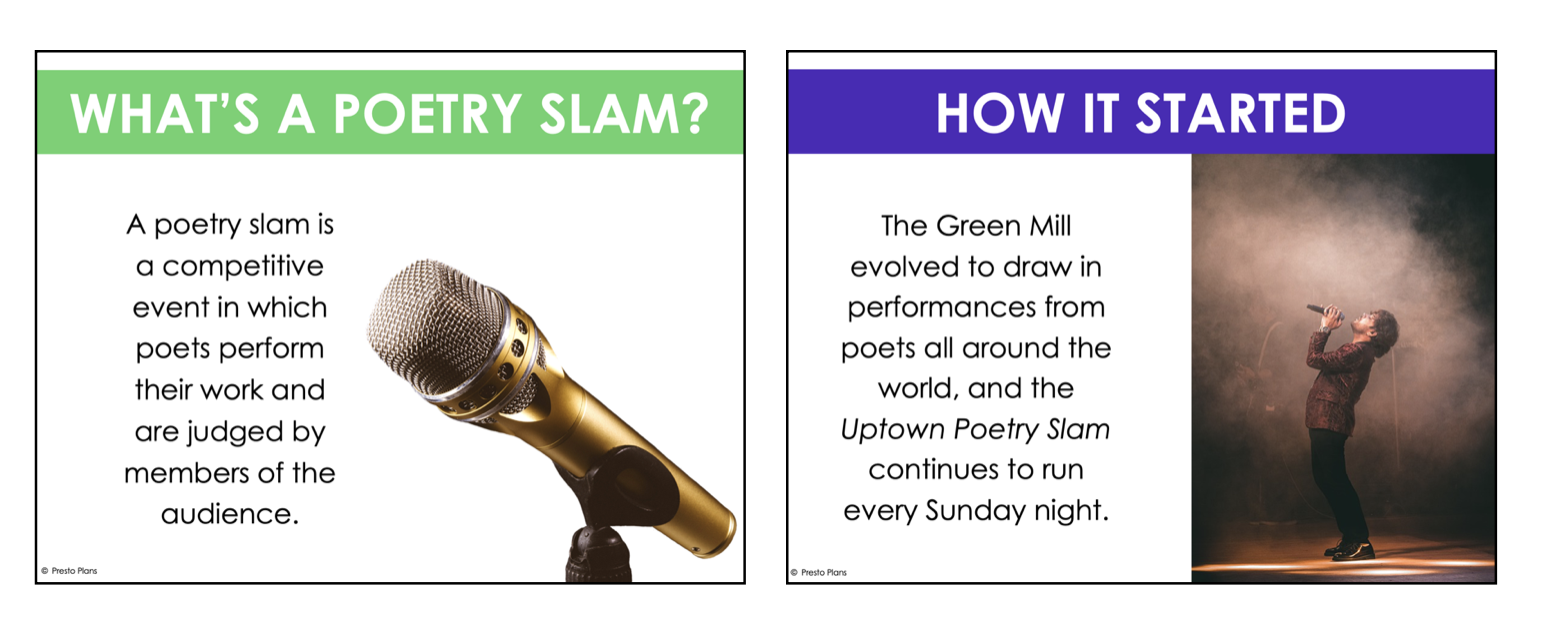
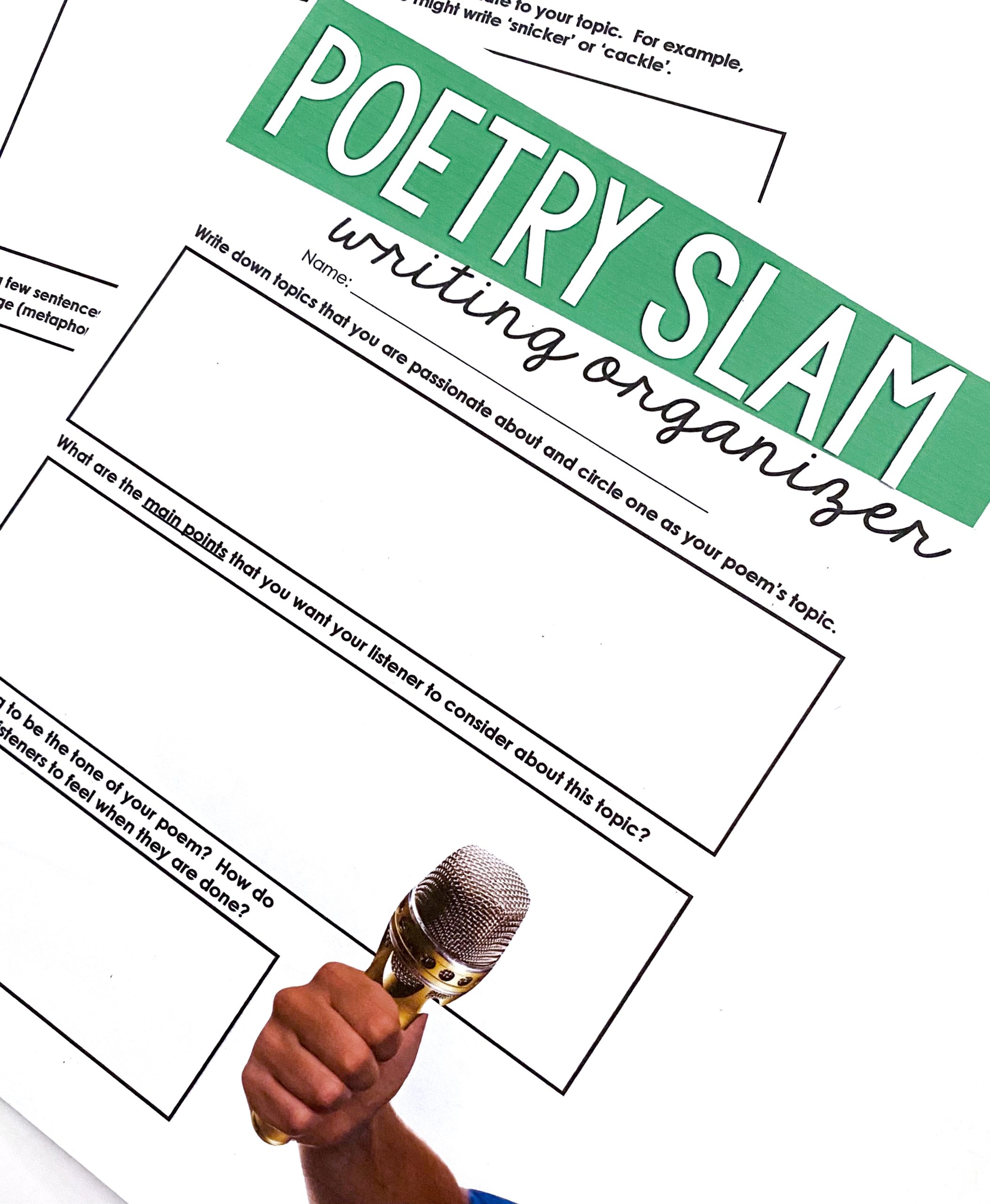
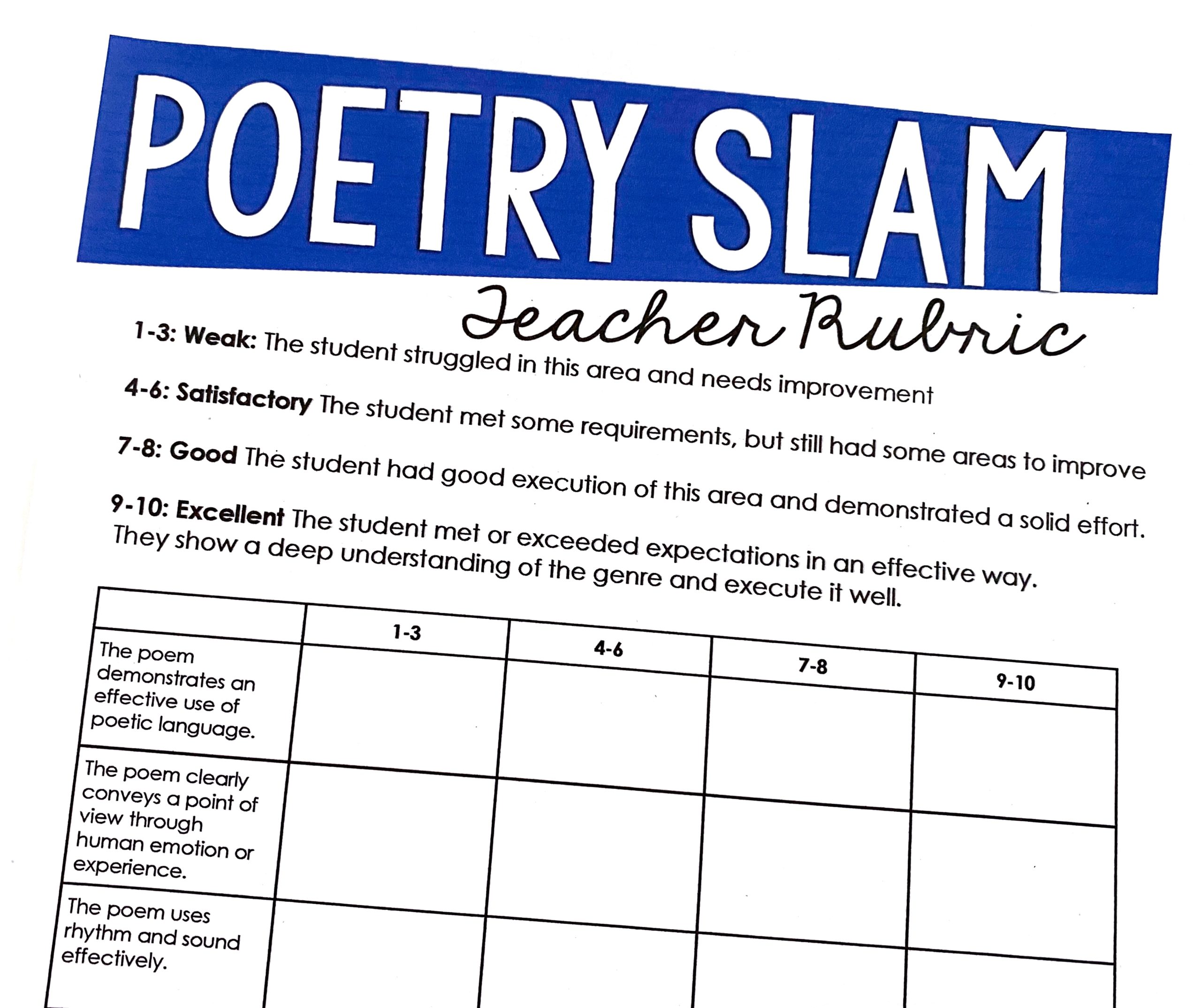
share this post